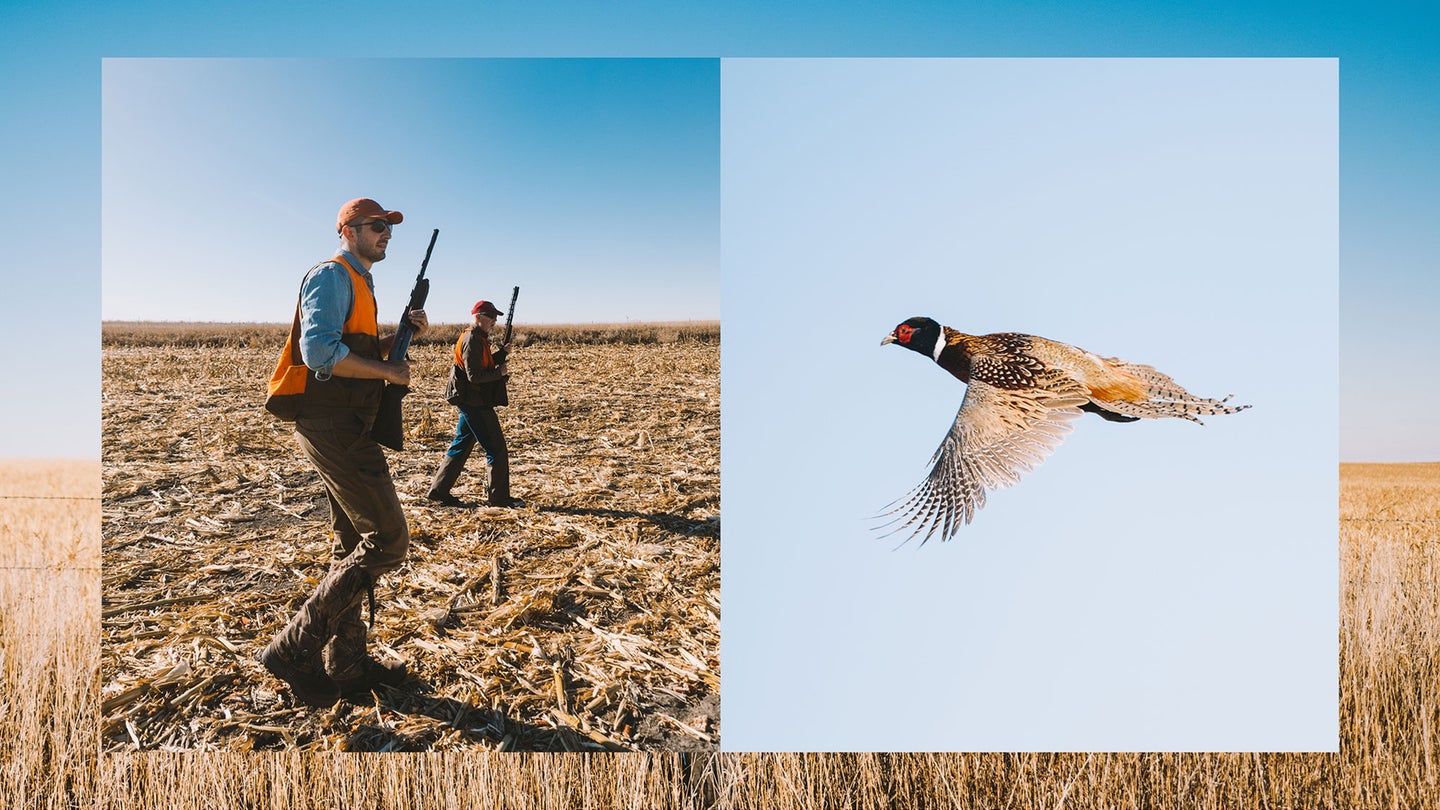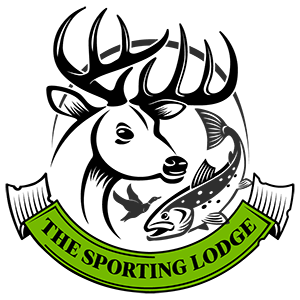Shoot for the Stars: A Pheasant Hunt Brings a Father and Son Closer Together

AS WE BOUNCE onto the cornfield aboard the school bus, I’m reminded of the last time my dad and I rode in one of these together. Running school buses is our family business, and when I was a kid, I’d ride with him to drop off vehicles at drivers’ houses. Today, I can see he’s thinking the same thing as he smiles at me and points out the Blue Bird logo next to the driver—the same make as the ones he used to drive. But the old bus we’re on today is different.
For starters, all of the seats have been turned to face toward the middle aisle, so my dad and I—plus a handful of fellow hunters—sit facing one another like paratroopers about to leap into occupied territory. Behind the driver, a gun rack filled with 12-gauges is bolted to the floor. We’re also towing a mobile kennel loaded with Labrador retrievers.
One of Heckenliable’s Labs runs through standing corn searching for roosters to flush. Isaac Neale
The bus’s brakes squeak to a halt, giving way to the sound of squealing dogs. We disembark, loading our pockets from a crate of red shells on our way out before we step out onto a treeless, wide-open South Dakota landscape. In the distance, there’s an ocean of grassland; in front of us, patches of brown standing corn and milo are planted in quarter-mile-long blocks.
Overnight, clouds had rolled in, casting a gloomy ceiling over everything and kicking up a stiff 15- to 25-mph wind that rustles the dry crops. We don gloves and blaze orange stocking caps, while our guide, Brian Heckenliable, lets three Labs loose. Then we walk into the corn.
Ten steps in, the first rooster pheasant breaks free of the stalks, pumping its wings skyward. At first, the scene feels like it’s playing out in slow motion, as we all mount our guns. But the bird’s wings soon catch the wind blowing overhead, and it speeds away as if merging onto the interstate. Three of us fire every ounce of lead in our guns—and every shot falls behind the bird as it coasts. With the wind howling in my ears, I can barely hear Heckenliable behind us say, “You’re going to need about a 5-foot lead on that one.”
This was a first-ever South Dakota pheasant hunt for the author’s father, Glenn Every. Isaac Neale
Wind Farm
That morning, I’d woken up early in our room at the R&R Pheasant Hunting lodge in Seneca, South Dakota, staring at a coat rack full of brown and orange waxed cotton. It was the first of a three-day pheasant hunting trip. Our plan was to break up our time here into two hunts per day. We’d hit standing corn or milo fields in the morning, then after lunch we’d head to the prairie to chase roosters in wild cover.
But out in the corn, the wind is posing a challenge. My dad and I aren’t used to shooting birds moving this fast. Actually, we aren’t used to hunting pheasants at all. We mostly hunt deer together in thick New York woods back home. In fact, on the flight out here, I was surprised to learn that my dad had never seen wide-open country like this before.
The father-son duo stand posted as the other hunters push birds their way. Isaac Neale
Heckenliable has seen this all before, though. He wears an oversized and faded bird vest with “PeeWee” embroidered on the lapel and has a one-liner for every bad shot in the book. As we push forward, rooster after rooster flushes into the gale, blowing away like dandelion seeds, and we have a chance to hear almost everything Heckenliable’s got.
After my dad forgets to take off the safety: “Did you bend the trigger?”
After I spin 360 degrees trying to follow a speeding bird: “You nearly corkscrewed yourself into the ground.”
After my dad holds off shooting what he thinks is a hen: “That’s a rooster. You’re supposed to shoot those.”
After I miss a rooster that flies into the sun: “We’ll have to get you a welding mask.”
But in the next patch of corn, we find our stride, and Heckenliable’s one-liners turn to praise. We hit a few birds before they can gather speed. But with only a second or two to draw and shoot, I stay alert as we all push forward one step at a time through the stalks.
The block of corn we’re hunting is long and planted on low rolling hills that feel like ocean swells. There’s just enough height to the hills that you sometimes can’t see in front of you before you walk over one. I’m coming up over one of these rises when I get another chance at a rooster.
The hunters pauses for a break. Isaac Neale
This bird is on the ground, straight ahead of me, standing between the same two rows of corn that I’m walking down. Just as he spots me, I notice one of Heckenliable’s yellow Labs run down the next row of corn beside me toward the bird. Cornstalks rustle in the dog’s wake, and he disappears for a moment before bursting out next to the rooster. The bird leaps, and I hit it with one shot, folding it back into the stalks.
I catch my dad out of the corner of my eye. He flashes me a thumbs-up. Were we hunting alone, we’d probably stop and chat about the bird. But with our line of hunters lurching forward, we both take our places and move ahead.
Time Flies
In my teens and twenties, my dad and I worked together at the garage. I spent summers sweeping aisles and washing windows, but I eventually became a driver, too. Now in my 30s, married and working as a writer, it feels like I’ve woken up in a different world—far away from the one my father built for our family. Dad and I haven’t grown apart, but before this trip I realized that we now each had our own worlds to take care of. So when some acquaintances at CanAm told me I could invite him to hunt alongside me for a few days on a media trip, I didn’t think twice about booking two tickets to South Dakota.
A bird flushes in the middle of the hunting party. Isaac Neale
Looking over at my dad, I can see that he has the same serious expression I’ve observed on his face during hunts together back home. He looks focused on making every shot count—and that’s when I realize he’s homed in on a birdy dog. A rooster flushes between us, its feathers flashing loudly against the drab stalks. I barely have time to react, but my dad, ready, swings through the bird’s long tail and past its beak with his shotgun bead. At the shot, the rooster tumbles, and the dogs jump in after it. His steely face relaxes and he smiles as he watches a Labrador emerge from the cover and bring the bird to hand.
For my dad, it had been an especially hard year. The pandemic had forced him to downsize the business; three family members had died on both his and my mother’s side; his dog had passed; and his sister now needed a live-in caretaker. When we had more time together—especially if one of us was going through a difficult time—he and I would sit in his backyard in the evening, staying out past dark to talk. Nights like those are when he taught me to appreciate the natural world. I was always struck by how the stars would capture his imagination, like he’d just discovered them for the first time.
Cold temps and strong winds forced the hunters to dress warm—and lead birds by a healthy margin. Isaac Neale
Back then, we had hours to look up and pick out constellations and talk until we’d solved our and the world’s problems. These days, with work and other day-to-day obligations, I have fewer opportunities to connect with him. On this trip, I had hoped we could find more time to have those long conversations again—but so far I’ve struggled to break away from work mode, sneaking away for time on my computer between hunts and taking notes while we are out in the field. After lunch, I barely had time to suit up and catch up with my dad and the group on the bus for our afternoon hunt.
A lone pheasant coasts over a milo field. Isaac Neale
* * *
On the prairie, R&R owner Sal Roseland and Heckenliable guide us. It’s part hunt, part tour of the family’s 18,000-acre ranch. Here and there, we see remnants of homesteads and settlers. The ranch was founded in 1881 by Norwegian immigrants—Roseland’s ancestors.
“That’s where the wheels fell off,” Roseland says, pointing to a patch of ground where his family first built their home. The landscape is nondescript, wide open, and daunting. It reminds me of the homestead my dad and I have hunted for years back home. Our group moves on. In a moment, we’ll rush to catch up with them and make another push through the prairie—but not before Dad and I take the time to pause and look out over the endless horizon.
“We need to come back out here,” he says, “and look at the stars one night before we go.”
Clear Skies Ahead
For our last hunt, my dad and I are paired apart from the group, posted on an old dam while the rest of the hunters push birds toward us from a quarter mile away. With our guns broken open, we stand together before the action picks up. “We’ve got to come back here, Matthew,” he says. But before I can agree, I see the first rooster flying high toward the spot I’m supposed to be covering. I have just enough time to mount my gun and put a good lead on the bird before pulling the trigger. The rooster balls up in midair and comes crashing to earth.
The rest of the hunt unfolds like a European driven shoot with pheasants flying high overhead. The next shots go about the same. And with a limit of birds on the ground, we call it a day.
Glenn Every stops to reload. Isaac Neale
* * *
On our last night, the forecast cleared and the clouds finally rolled away. My dad and I had planned to go out into the prairie after dinner to look up at the stars, but we wound up staying up late with the rest of our crew.
The next morning, my alarm buzzed at 3:45 a.m. In a daze, I cleared the empty shot shells from my pockets and shoved clothes into my suitcase. When I stumbled out with the luggage into the main room of the lodge, I found a note from Heckenliable: Your pheasant meat is packed and ready to go in my cooler under the porch of the big lodge.
I’d almost forgotten that we each had a small bag of meat to take home. It was still pitch-black, and when I went outside to walk toward the porch, I saw a figure silhouetted in the bit of light coming from the lodge. It was my dad. He was looking at the sky.
I went to stand next to him and gaze up at the stars. For this brief moment, it felt like we’d regained all the time we’d lost. With our eyes locked on the void overhead, we stared. Then I heard him say, “It’s spectacular.”
Read more F&S+ stories.
The post Shoot for the Stars: A Pheasant Hunt Brings a Father and Son Closer Together appeared first on Field & Stream.
Articles may contain affiliate links which enable us to share in the revenue of any purchases made.
